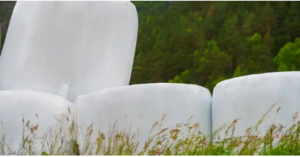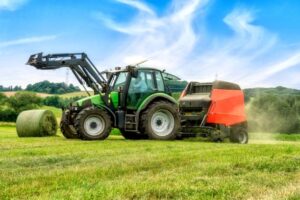Bales wrapped with silage wrap significantly minimise exposure to elements that cause spoilage, leading to a decrease in waste. They also help preserve the nutritional quality of the forage and reduce physical losses from baling equipment.
Like net wrap, silage film is typically added with a UV stabiliser to prevent it from breaking down or deteriorating quickly. It helps ensure that your hay bales will maintain their feed value for an extended period.
1. Prevents Moisture From Entering
 Silage wrap helps to prevent rain and snow from entering hay bales, reducing moisture and spoilage. It also allows farmers to store the hay in a barn or other structure rather than building a dedicated storage facility which can be expensive and time-consuming to build.
Silage wrap helps to prevent rain and snow from entering hay bales, reducing moisture and spoilage. It also allows farmers to store the hay in a barn or other structure rather than building a dedicated storage facility which can be expensive and time-consuming to build.
It’s important to wrap a bale within 24 hours of making it so that the fermentation process can begin. Bales wrapped after this time can lose dry matter and decrease lactic acid content, which impacts the quality of the feed.
2. Prevents Mold From Growing
White mould is often blamed for poor haylage quality or spoilage, but the truth is that bad wrapping practices usually cause it. Using silage wrap incorrectly can cause air to penetrate the bale, providing the perfect environment for fungi to grow and preventing lactic acid-generating bacteria from doing their job.
The best way to avoid these problems is to use a good wrapping machine that allows for a tight seal and apply the silage film correctly. Using the correct number of layers is important, as well as choosing a film with a puncture resistance appropriate for the crop being protected.
Wrapping should take place as soon as possible after the baling process, ideally within 24 hours of harvesting. Leaving bales unwrapped or delaying the process for longer than this can result in lower forage quality and increased levels of mould throughout the entire bale. It’s also important to store wrapped bales on washed gravel to reduce the risk of holes in the plastic causing leakage and contamination. It will also help reduce the risk of rodents entering the bale and introducing more contamination.
3. Prevents Combustion
The outer layer of hay is prone to moisture and oxygen, which can cause it to spoil. Wrapping the bales prevents this from happening and helps to keep the hay fresher for longer. That is why many producers recommend wrapping hay at or above 20% moisture.
Bales that are wrapped properly can retain their feed value for a year or more. Silage wrap protects a bale from the elements, mould and rot by creating an airtight environment that preserves the hay’s nutrients.
The silage wrap is typically made from quality LLDPE with UV stabilisers to prevent moulding and shock during transport. In addition, they are often available in different colours to increase visibility during storage and transport.
Both tube wrappers and bale wrappers can be used to wrap hay bales. The main difference is that a tube wrapper uses a continuous tube of plastic to wrap the bales, while a bale wrapper individually wraps each bale in a sheet of plastic.
Regardless of which wrapper you choose, it’s important to use the correct number of layers. Most wrappers will have a table in their operator’s manual that will indicate how many layers are required for different moisture levels. A higher number of layers will be necessary for drier bales. It is because drier hay has sharper stems that may poke through the first few layers of the film.
Bales of hay and straw are harvested and preserved to be used as fodder for animals during the winter. The bales are usually wrapped to keep them fresh.
The hay should be wrapped within 24 hours of baling. Wrapping at a moisture level under 45% will allow for the best fermentation and longer-term storage.
 SFH-Elite is manufactured using co-extrusion technologies. This maximises the mechanical aspects of the film to produce a high-performance bale wrap. It possesses essential properties such as strength, puncture resistance, elasticity, UV stability and excellent cling. With these features, SFH-Elite offers consistent, trouble-free performance that enhances baling efficiency and throughput.
SFH-Elite is manufactured using co-extrusion technologies. This maximises the mechanical aspects of the film to produce a high-performance bale wrap. It possesses essential properties such as strength, puncture resistance, elasticity, UV stability and excellent cling. With these features, SFH-Elite offers consistent, trouble-free performance that enhances baling efficiency and throughput.
